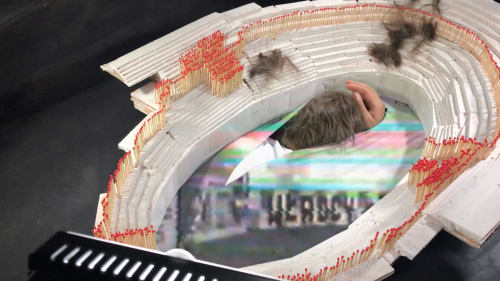It is a bold move to devote your gallery to a single artist for an entire year. What might be commercial suicide to one is to Harlan Levey Projects a way of expressing its trust in artist and close friend Marcin Dudek. And it is definitely deserved!
I first met Marcin Dudek in 2013. From first to last, it was an encounter that will be etched in my memory forever. Thanks to the art that he creates, how he creates it, and the profundity, energy, generosity, and willpower that he exudes while doing so, and thanks to the person that he evidently is because of all this.
“Reality can be moved, constructed, destroyed, reconstructed, reconfigured, composed, mutated...” the Krakow-born, Brussels-based artist told me at the time. “You have to do as much with reality as you can, otherwise you just become a boring part of it.” With an admirable lack of respect for anything fixed that can be taken apart with a little wrenching, he delved deep into the earth, the walls of the gallery space, the materials, and…himself.
Over the past few years, the latter movement – a necessity for the artist as an experience and process – has led Marcin Dudek to dig ever deeper into his own personal history and the broader circumstances of those experiences. Only to emerge with a heart-wrenching and chastening story about his early years as a fan of the football club Cracovia during the latter years of communism, about the appeal of hooliganism, its social structure, its shared goals, and its violent release.
In “Slash & Burn I”, he pursues this exploration. Through only three works, which might each take up half a lifetime. For example, Slash & Burn is an overwhelming, monumental whole consisting of 159 painted collages that evoke a fire at the Bradford City stadium in 1985. The collages, which almost maniacally combine archival materials, acrylic paint, ash, medical tape, and UV varnish on wood in an abstracted architectural structure of the stadium, were then set on fire, to reconstruct the movement of the fire.
ANTI-READYMADE
It is that insane fire – relentless to himself, but generous to the viewer – Marcin Dudek himself brings to bear on his work. In everything he does, always anew. “Art as a strategy for living,” Harlan Levey calls it.
The materials to do this are there, you only need to manipulate them, both mentally and tangibly. How tangible things sometimes become is evident in Akumulator, a “one-to-one scale replica of a gym” Marcin Dudek built in a squatted basement of a Krakow council estate in the 1990s. A “memory box” made up of weights made of radiators from his former studio at Greylight Projects, the beat-up door from one of his family's businesses (opened after the fall of communism), and a bench press and punching bag taken from an earlier exhibition. “An anti-readymade, analogue resistance to mass mechanisations; a sanctuary of neglected materials.”
Finally, a video recording of his performance Tribunalia shows the head of Marcin Dudek in the middle of a homemade stadium, with matches for spectators. A transformation occurs: the artist shaves his hair off and spits obscenities, the matches are lit, and the individual disappears in an all-consuming fire that spares nothing and no one. I exit moved, destroyed, reconfigured. That is what is at stake. In life and in art. Marcin Dudek is definitely worth the trust!

